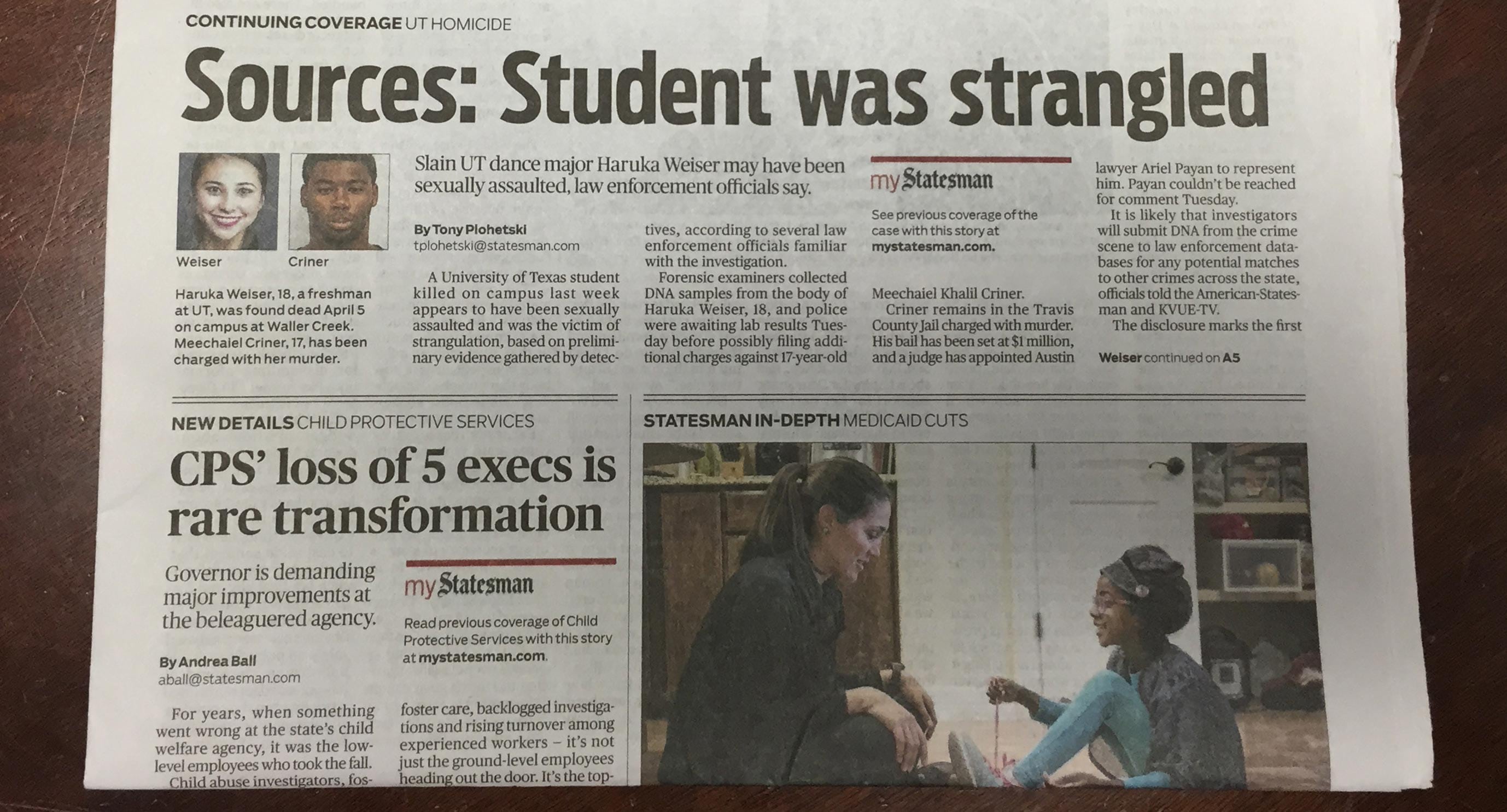Statesman Front Page: Tragedy Multiplied Exponentially
Written by Kelly White
The April 13th front page of the Austin American-Statesman featured three tragically related stories:
- Haruka Weiser, an 18-year-old University of Texas student is sexually assaulted and strangled – her accused assailant a runaway from the foster care system, himself a victim of repeated child abuse.
- Child Protective Services (CPS) pummeled by child deaths, backlogged investigations and rising turnover in staff – loses five top level executives.
- Eight-year-old Brianna Dupuie, shaken so hard at age one that she had a stroke causing paralysis on her right side, may lose her Medicaid coverage that currently covers her weekly intensive therapy.
Tragedy multiplied exponentially.

It is past the time for our community, state, and nation to recognize that violence and abuse long ago reached epidemic levels, it is viral, and in addition to being deadly in the moment, it can also lie dormant in the effected organism waiting to erupt insidiously through another pathway, as evidenced by the horrific murder of Haruka Weiser.
We must develop more effective, systemic, and organic ways of eliminating the breeding ground for this virus and addressing the infection. Violence and abuse represent a public health emergency that must be addressed on a broad societal, cultural, and systemic level as well as through primary prevention and intervention efforts. The SAFE Alliance was created with that goal in mind.
SAFE, a partnership between Austin Children’s Shelter and SafePlace, recognizes the need to address the intersections between sexual assault and exploitation, child abuse and domestic violence. We are committed to never again seeing an abused child that is victimized as an adult; a little boy that watches his dad beat his mother and then later hurts his own girlfriend; a battered women that loses custody of her children because of abuse by their father; or all the other myriad examples of the epidemic of violence and abuse that is transferred person to person and generation to generation.
The survivors we work with often experience multiple forms of violence and abuse in their lifetimes. We know that:
- Research shows that victims of one form of violence can face double or triple the risk of experiencing other forms of violence;
- One of the best predictors of future victimization is past victimization; and
- Two of the most consistent factors associated with future violence outcomes (as a victim and/or a perpetrator) are child abuse and exposure to domestic violence.
According to the Centers for Disease Control, children who have experienced abuse or neglect are two to three times more likely to experience violence and abuse as adults. Similarly, children who witness intimate partner violence are six times more likely than their peers to experience violence as adults.
While violence and victimization are not inevitable, this research strongly reinforces the interconnectedness of the multiple forms of violence and abuse, and that increased efforts to address these issues and their related traumas would dramatically reduce violence.
Where do we begin to address such enormous and seemingly intractable problems?
We must continue to ensure immediate safety for those in danger while simultaneously investing in broad-based prevention programs. We must ensure access to affordable and quality mental health and substance-abuse programs, affordable housing, health care, positive parenting programs, bullying prevention and helping teens learn about healthy relationships and what “consent” looks like.
We need elected officials genuinely committed to ending violence and abuse and willing to commit the significant funding needed to do more than slap on a cosmetic Band-Aid. We must address these issues in the holistic way in which people really live their lives, rather than the segmented and separated worlds of governmental departments and funding and regulatory bodies.
It’s past the time to commit to genuine change. We’ve lost too many Harukas already.